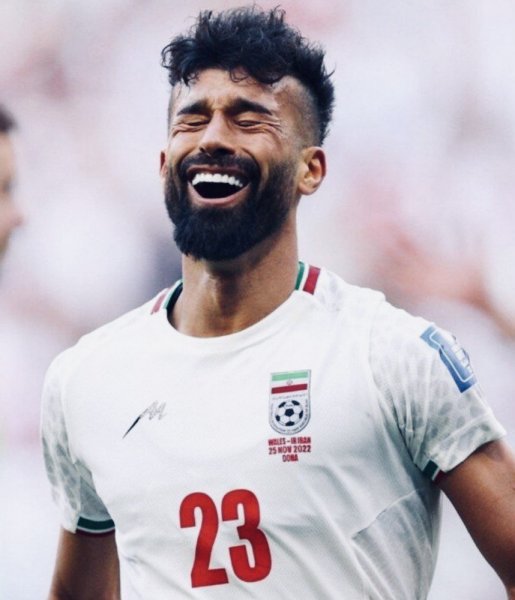Iranians in a Grotesque Situation
The Iranian national football team and the World Cup, which always brought unity and excitement among Iranians of all beliefs and ideologies, have this year, paradoxically, created a divided situation among Iranians.
Mohammad Fazeli, a sociologist whose remarks have been widely seen and heard in recent debates on state television regarding protests, tweeted after Iran’s victory over Wales. He expressed concern about people being pitted against each other, blaming the current rulers. He wrote, ‘It is unclear when and how the wounds of these rifts will bleed or heal, but the culprit is clear: you and your actions. Why don’t you learn?’
This situation or feeling, which was greatly intensified after the 6-0 loss to England, was somewhat alleviated after Iran’s victory in the second match against Wales, with efforts to foster the belief that the national team belongs to the people.
It belongs to Iran, not the power structure. The idea that football is a shared national heritage, not owned or monopolized by any individual, group, or faction, is the same foundation that, after the dust of political and social conflicts settles, guarantees the continuity of our social life and that of future generations in this land.
Caught Between Sorrow and Joy
However, the situation for most football enthusiasts is a mix of contradictions. Their feelings fluctuate between support and indifference, between sorrow, alienation, hardship, and joy. A reformist political activist wrote, ‘Our joy is incomplete. I wasn’t happy, yet I was. During the match, I wanted us to win. When we scored, I was happy, but not like always. An hour after the game, the same pre-match feeling returned. Hearing about the deaths in Zahedan, not even two goals, let alone ten, can replace the sorrow and regret of even one lost life.’
Another wrote that this fleeting happiness is incomparable to the joy and pride our neighbors in Qatar have, or to our own joy four years ago against Portugal. ‘I’m not being stubborn, it’s not an act, it’s not influenced by others, and I don’t think it’s forced.’
The charm of football lies in its communal nature, whether playing, watching, or experiencing its sorrows and joys. Today, some people have boycotted football and feel bad, which is why it doesn’t feel right. The opiate of football, even in this bad state, has only a momentary effect.
Mehdi Yazdani Khoram, a writer and journalist, wrote, ‘We are heirs to simultaneous sorrow and joy. We laugh in the height of pain and suffer in the height of pleasure. We are tough-skinned. During today’s goals, exactly at the moment the ball crossed the net in this game on the fourth of Azar, I cried from the depths of my soul. I saw spirits whose wounds were still bleeding, yet they were crying. I wanted to be an open embrace for all of Iran. What has happened to us? Why are the secrets of my land so contradictory?’
Grotesque Riot Forces
In dramatic literature, grotesque has a concept similar to dark humor, a hesitation between laughing and being terrified, and being undecided between ridiculousness and darkness. We witness this grotesque situation these days, and it became more apparent after Iran’s victory over Wales, where images of riot forces celebrating with dancing, distributing sweets, honking horns, waving flags, spraying colors, and playing cheerful music and light shows from inside riot vehicles were widely shared.
The disbelief of the audience at this situation is evident across social media. Some describe it as a highly surreal, apocalyptic situation. ‘We didn’t die without seeing these days,’ some say. A Twitter user, sharing an image of a few chocolates in their hand, wrote, ‘If the dose of surrealism and contradictions in the atmosphere is still low for you, let me add that tonight I received chocolates from the special unit, the same unit that in other days served and benefited me and others in various ways.’
Grotesque Voria
This grotesque has other angles. The national team entered the World Cup while some former prominent national team footballers have become well-known faces among protesters these days, from Ali Karimi to Ali Daei. But more importantly, the news of Voria Ghafouri’s arrest just the night before the Iran-Wales match, the one who said that when social concerns are raised, football is his second priority. Someone wrote, ‘I wish they would leave Voria alone for today’s game, as he has penetrated hearts beyond football, maybe softening hearts a little.’
Mehdi Tedini, a translator and researcher in the field of politics, points to these very words of Voria to explain why he is dear. In an interview, Voria said that when people’s pain is widespread, sports are no longer a priority. Tedini writes, ‘Yes, Voria is great and respectable because he articulates this clearly and transparently. This good Kurdistan boy has taught us a lesson. The clear manifesto of an athlete who does not separate his professional life from social life. Adherence to ethical principles has a cost.’
Voria Ghafouri was arrested on charges of insulting the national team, although experts point out that, firstly, such a criminalization does not exist in our laws to justify someone’s arrest, and secondly, if insulting and undermining the national team is a crime, why has no action been taken against Hassan Abbasi?
Hassan Abbasi has not only insulted the national team but also the entire country’s footballers with shameless adjectives. Why has no one filed a lawsuit against him? Incidentally, the act committed by Abbasi, insulting a specific group and describing them with unfavorable adjectives, is criminalized by law.

